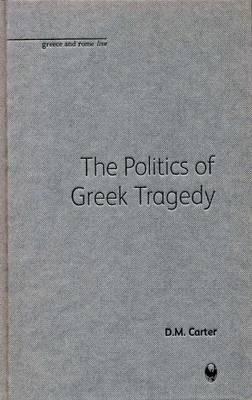Overview
This book addresses the political aspects of fifth-century Athenian tragedies, setting them in their immediate historical context. It is an important topic and one that only rarely finds its way into accessible accounts of Greek tragedy. Carter sets out to elucidate to a student and general audience how and why Athenian tragedy should be read as a political art form. The political content of ancient drama has been the subject of much scholarly debate in the last thirty years or so; but much of that debate is highly and inaccessible. Carter demonstrates that like the contemporary satirical comedy of Aristophanes, or indeed the sculptures of the Parthenon, tragedy involved a highly political dimension. He provides stimulating and provocative analyses, from varied points of view, of the political aspect in several individual tragedies (always referred to in modern translations). To this he also adds a chapter on the 'reception' of political tragedy, alluding to theatre and film productions of the Greek plays which have taken an overtly political stance within their modern context. * Part of the acclaimed Greece & Rome Live Series, which aims to introduce figures and aspects of the ancient world to the general reader * All quotation from and reference to the plays relates to easily accessible versions in translation * Includes handy combined index/glossary and a guide to further reading
Full Product Details
Author: D.M. Carter
Publisher: Liverpool University Press
Imprint: Bristol Phoenix Press
Dimensions:
Width: 13.80cm
, Height: 2.00cm
, Length: 21.60cm
Weight: 0.380kg
ISBN: 9781904675501
ISBN 10: 1904675506
Pages: 136
Publication Date: 15 November 2007
Audience:
College/higher education
,
Professional and scholarly
,
Tertiary & Higher Education
,
Professional & Vocational
Format: Hardback
Publisher's Status: Active
Availability: Out of stock

The supplier is temporarily out of stock of this item. It will be ordered for you on backorder and shipped when it becomes available.
Reviews
It is a real strength of the book that he illustrates by discussion of particular approaches, including his own, work in action. He puts theory into practice. This will prove very helpful to sixth formers and undergraduates alike. Overall the standard of accuracy is high, and the range of reading evinced is impressive. The book is highly recommended to schools and universities alike. A well-written contribution to the discussion on the nature of this much-studied genre, directed at students and the general reader as well as specialists. The first part addresses primarily the student while the main chapters engage in scholarly audience as well. 'The Politics of Greek Tragedy' takes an important step forward in the debate on the nature of Greek tragedy. What is really good is Carter's suggestion that we are dealing with a theatre of the establishment, that it is not particular democratic and that behind the dramatic events there are strong political values. Carter succeeds admirably. He makes a topic that is difficult and potentially confusing for the non-specialist, comprehensible and highly readable. The book combines some very basic introductory material with some fairly sophisticated arguments about Greek tragedy. While its primary audience is students, there is something here for specialists as well. [...] Carter's book is admirable for the clear was it introduces this topic to the general reader [...] as an introductory survey book for the general reader, it is an unqualified success.
It is a real strength of the book that he illustrates by discussion of particular approaches, including his own, work in action. He puts theory into practice. This will prove very helpful to sixth formers and undergraduates alike. Overall the standard of accuracy is high, and the range of reading evinced is impressive. The book is highly recommended to schools and universities alike. -- James Morwood The Journal of Classics Teaching, No. 14 2008 A well-written contribution to the discussion on the nature of this much-studied genre, directed at students and the general reader as well as specialists. The first part addresses primarily the student while the main chapters engage in scholarly audience as well. 'The Politics of Greek Tragedy' takes an important step forward in the debate on the nature of Greek tragedy. What is really good is Carter's suggestion that we are dealing with a theatre of the establishment, that it is not particular democratic and that behind the dramatic events there are strong political values. -- Synnove Des Bouvrie Bryn Mawr Classical Review, 6.12 2008 Carter succeeds admirably. He makes a topic that is difficult and potentially confusing for the non-specialist, comprehensible and highly readable. The book combines some very basic introductory material with some fairly sophisticated arguments about Greek tragedy. While its primary audience is students, there is something here for specialists as well. [...] Carter's book is admirable for the clear was it introduces this topic to the general reader [...] as an introductory survey book for the general reader, it is an unqualified success. -- Leona MacLeod Scholia Reviews, no. 19 2010
Author Information
D.M. Carter is Lecturer in Greek at the University of Reading.



